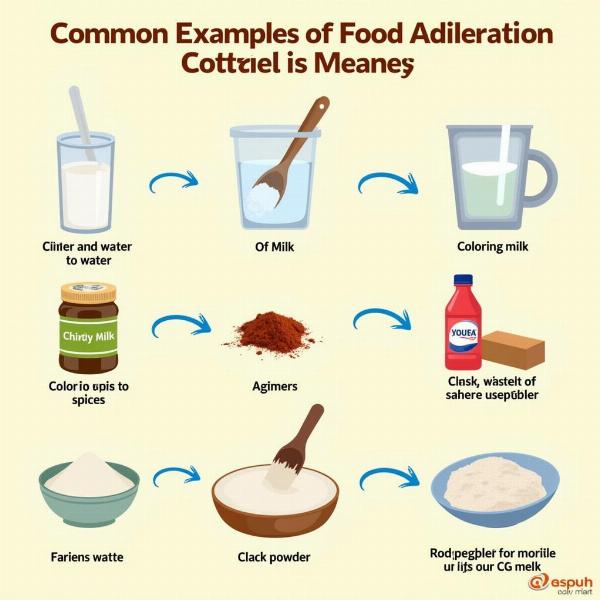Adulteration, a pervasive issue affecting food and other products, raises concerns about safety and quality. Understanding the meaning of “adulterant” in Hindi, along with its implications, is crucial for consumers and businesses alike. This article delves into the various aspects of adulteration, exploring its meaning, common examples, health risks, and legal ramifications. It also highlights the importance of vigilance and consumer awareness in combating this widespread problem.
What Does Adulterant Mean in Hindi?
In Hindi, “adulterant” is commonly translated as मिलावट (milavat). This term encompasses the act of adding inferior or harmful substances to a pure product, thereby compromising its quality and potentially posing health risks. मिलावट (milavat) can refer to a wide range of substances, from simple impurities to toxic chemicals. The motivation behind adulteration is often economic, driven by the desire to increase profits by reducing production costs. However, the consequences can be severe, impacting public health and eroding consumer trust.
 Examples of Food Adulteration
Examples of Food Adulteration
Common Types of Adulterants and Their Hindi Names
Various substances are used as adulterants in different products. Here are some common examples:
- Milk: Water (पानी – paani), detergent (डिटर्जेंट – detergent), urea (यूरिया – urea)
- Spices: Artificial colors (कृत्रिम रंग – kritrim rang), sawdust (लकड़ी का बुरादा – lakdi ka burada)
- Oil: Argemone oil (अर्गेमोन तेल – argemon tel)
- Flour: Chalk powder (चॉक पाउडर – chalk powder)
This list is not exhaustive, but it highlights the diverse nature of adulterants and the potential harm they can pose.
Health Risks Associated with Adulterated Products
Consuming adulterated products can have serious health consequences, ranging from mild discomfort to life-threatening illnesses. Some of the potential health risks include:
- Food poisoning: Contaminated food can cause nausea, vomiting, diarrhea, and other gastrointestinal problems.
- Long-term health issues: Exposure to certain adulterants can lead to chronic diseases like cancer, kidney failure, and liver damage.
- Allergies: Some adulterants can trigger allergic reactions in sensitive individuals.
Legal Implications of Adulteration in India
Adulteration is a serious offense in India, with strict laws in place to protect consumers. The Food Safety and Standards Act, 2006 (FSSAI) outlines regulations and penalties for food adulteration. Penalties can include fines, imprisonment, and cancellation of licenses.
How to Identify and Avoid Adulterated Products
Consumers can take several steps to protect themselves from adulterated products:
- Buy from reputable sources: Choose established brands and retailers with a good track record.
- Check labels carefully: Pay attention to the ingredients list, manufacturing date, and expiry date.
- Be wary of unusually low prices: If a product seems too cheap, it might be adulterated.
- Perform simple tests: Several home tests can help identify common adulterants in food items.
What to Do If You Suspect Adulteration
If you suspect a product is adulterated, you can report it to the FSSAI or the local consumer protection authorities. Providing evidence, such as the product packaging and purchase receipt, can help with the investigation.
Expert Insights
Dr. Anjali Sharma, a renowned food scientist, emphasizes the need for increased consumer awareness: “Consumers play a crucial role in combating adulteration. By being informed and vigilant, they can protect themselves and their families from the harmful effects of adulterated products.”
Mr. Rajesh Kumar, a legal expert specializing in consumer rights, highlights the legal recourse available to consumers: “The FSSAI provides a robust framework for addressing food adulteration. Consumers should not hesitate to report suspected cases and exercise their legal rights.”
Conclusion
Understanding the “adulterant meaning in Hindi” – मिलावट (milavat) – is vital for safeguarding public health. By being aware of the risks, identifying common adulterants, and taking preventive measures, consumers can contribute to a safer and healthier marketplace.
FAQ
- What is the penalty for food adulteration in India? Penalties can range from fines to imprisonment, depending on the severity of the offense.
- How can I report a case of food adulteration? You can report it to the FSSAI or the local consumer protection authorities.
- Are there any home tests to detect adulteration? Yes, several simple tests can be performed at home to identify common adulterants.
- What is the most common type of food adulteration? Adulteration of milk and spices are among the most common types.
- What are the long-term health risks of consuming adulterated food? Long-term health risks can include cancer, kidney failure, and liver damage.
- What does FSSAI stand for? FSSAI stands for Food Safety and Standards Authority of India.
- How can I protect myself from buying adulterated products? Buy from reputable sources, check labels carefully, and be wary of unusually low prices.
Meaning-Hindi.in, a leading translation service provider, specializes in accurate and culturally sensitive translations from Hindi to various languages and vice-versa. Our expertise covers a wide range of domains, including business and legal documents, technical manuals, website localization, and educational materials. We also offer expedited translation services for urgent requirements. Contact us today for your translation needs at [email protected] or +91 11-4502-7584. Meaning-Hindi.in is committed to providing high-quality translation services that bridge language barriers and facilitate effective communication.